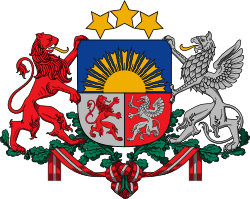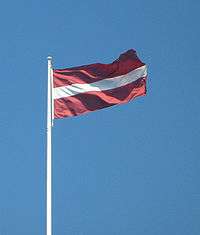Elections in Latvia
 |
| This article is part of a series on the politics and government of Latvia |
| Foreign relations |
Elections in Latvia gives information on election and election results in Latvia.
Latvia elects on national level a legislature. The Saeima has 100 members, elected for a four year term by proportional representation with a 5% threshold. An unmodified Sainte-Laguë method is used to allocate seats. The parliamentary elections are held on the first Saturday of October. Locally, Latvia elects municipal councils, consisting of 7 to 60 members, depending on the size of the municipality, also by proportional representation for a four year term.
Latvia has a multi-party system, with numerous parties in which no one party often has a chance of gaining power alone, and parties must work with each other to form coalition governments.
2014 Parliamentary election
A parliamentary election was held on 4 October 2014.
| Party | Votes | % | Seats | +/– |
|---|---|---|---|---|
| Harmony | 209,887 | 23.00 | 24 | –7 |
| Unity | 199,535 | 21.87 | 23 | +3 |
| Union of Greens and Farmers | 178,210 | 19.53 | 21 | +8 |
| National Alliance | 151,567 | 16.61 | 17 | +3 |
| For Latvia from the Heart | 62,521 | 6.85 | 7 | New |
| Latvian Association of Regions | 60,812 | 6.66 | 8 | New |
| Latvian Russian Union | 14,390 | 1.58 | 0 | 0 |
| United for Latvia | 10,788 | 1.18 | 0 | New |
| Latvian Development | 8,156 | 0.89 | 0 | New |
| New Conservative Party | 6,389 | 0.70 | 0 | New |
| Freedom. Free from Fear, Hate and Anger | 1,735 | 0.19 | 0 | 0 |
| Growth | 1,515 | 0.17 | 0 | New |
| Sovereignty | 1,033 | 0.11 | 0 | New |
| Invalid/blank votes | 6,953 | – | – | – |
| Total | 913,491 | 100 | 100 | 0 |
| Registered voters/turnout | 1,552,235 | 58.85 | – | – |
| Source: CVK | ||||
Past elections and referendums
Referendums
The Constitution of Latvia proscribes a referendum for five purposes:[1]
- recalling of the Parliament (Article 14)
- acceding to the European Union (Article 68)
- accepting substantial changes in the terms regarding the membership in the European Union (if requested by 50% of the Parliament) (Article 68)
- accepting legislation suspended by the President (Article 72)
- amending the Constitution or adopting a law (Article 78)
One tenth or registered voters has the right to initiate a national referendum regarding recalling of the Parliament. Voter turnout needed is two thirds of the number of the voters who participated in the last elections for the Parliament. The Constitution imposes several restrictions on when the recall referendum can be held. It cannot be held:
- one year after the parliamentary elections
- one year before the parliamentary elections
- six months before the presidential elections
- six months after the last recall referendum.
There was one such referendum - parliamentary dissolution referendum of 2011.
Substantial changes in the terms regarding the membership of Latvia in the European Union shall be decided by a national referendum if such referendum is requested by at least one-half of the members of the Parliament.
In certain cases the President or one third of members of the Parliament have the right to suspend the proclamation of a law for a period of two months. A referendum will be held on that law if in that two-month period one tenth of the electorate requests a referendum, except if the Parliament again adopts the law with three three-quarters super-majority. Voter turnout needed is 50% of the number of the voters who participated in the last elections for the Parliament. If no referendum is requested in the two-month period, then the law is put into effect. Such a referendum was held on three occasions: in 1998, 1999 and 2007
The constitution limits issues which can be submitted to a referendum. It forbids issues like budget, taxes, military conscription, declaration of war, peace treaties, agreements with other nations, etc.
One tenth of the electorate can request amendment of the Constitution adoption of a law. If the Parliament does not accept the amendment or the draft law, then it will be submitted to a referendum. Certain parts of the Constitution can be amended only by a referendum. Absolute majority (majority of all electors, regardless of voter turnout) is required for an amendment or a draft law to pass on such a referendum. The exception is decision regarding membership of Latvia in the EU or substantial changes in the terms regarding membership in the EU - those measures need voter turnout of 50% of the number of the voters who participated in the last elections for the Parliament. Constitution amendments were on referendum in 2 cases: in 2008 and 2012, draft law was on a referendum in 2008 and European Union membership referendum was held in 2003.
There were 13 referendums in Latvia's history, of that 4 in 1923 - 1934 period and 9 since 1991.
See also
External links
- Adam Carr's Election Archive
- Parties and Elections in Europe
- National Elections Commission of Latvia
- OSCE reports on Latvian elections
- NSD: European Election Database - Latvia publishes regional level election data; allows for comparisons of election results, 1990-2010
References
- ↑ "The Constitution of the Republic of Latvia". Retrieved 2013-11-02.
